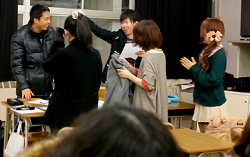 Given that learning appears to be an innate human trait, reason suggests that humans could devise a standard definition of learning. Such is hardly the case.
Given that learning appears to be an innate human trait, reason suggests that humans could devise a standard definition of learning. Such is hardly the case.
From ancient philosophers debating learning as either experience or reason to modern educators quibbling about whether learning is a process, product, or function, perspectives on learning seem to be as numerous as practitioners of learning. Theorists, researchers, practitioners, and philosophers may never agree on a single definition of learning because the definition seems to depend on so many dynamically interacting variables. Some of these variables include the philosophical and theoretical foundation of the institution, the social agenda of the administration, the philosophical perspective of the practitioner, the needs and capacity of the learner, and contextual factors.
The confusion presented by disparate perspectives on learning presents an opportunity to explore the foundations of modern education practice to understand why some learning programs apply the methods they do while providing a basis for a principal-based approach to learning that matches the method with context.
The Learning Perspectives category reviews competing perspectives on learning, from the classical foundations of rationalism and empiricism through the traditional classifications of learning theory-- behaviorism, cognitivism, humanism, and constructivism. The purpose of this exploration is to understand the foundations of historical and modern learning practice and to illuminate the practices that may best serve learners and context.
- Details
- Written by Brent A Duncan, PhD
- Category: Learning
A functionally diverse student population has joined the self-directed management-track learners who once dominated adult-oriented universities. Facing students with a broadening range of experience, knowledge, ability, and motivation, how can faculty meet individual learners' dynamic needs using the collaborative learning model that has served as a foundation for adult education?
- Details
- Written by Brent A Duncan, PhD
- Category: Learning
More than 50 higher education professionals joined me during the ACBSP Excellence in Teaching Track for a presentation on the impact that synchronous activities can have on students in online classrooms. The presentation explored literature on the tradeoffs students face for the convenience of online learning and opportunities that live interaction might offer to students in online environments. We also reviewed the results of a project to test the impact of live sessions on the psychological factors that serve as predictors of student success in otherwise asynchronous environments. The results found significant improvement in student learning outcomes and faculty satisfaction in comparison to control groups. The following are a link to the presentation slides and a summary of the research.





![Your brain can keep growing, adapting, and learning at any age, if you are willing to put in the effort [Image: Copilot]](/images/Images/best-years-for-adult-brain300.png)
